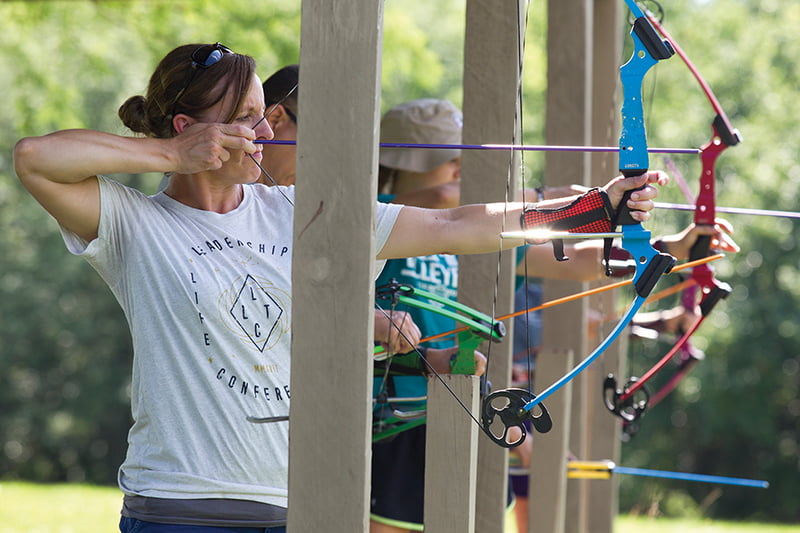
Angie Bittner, rural youth outreach coordinator for the archdiocese, takes part in family camp at Prairie Star Ranch. Bittner worries that people on the fence about the Catholic faith will fall away because of the abuse crisis. LEAVEN PHOTO BY JAY SOLDNER
by Olivia Martin
olivia.martin@theleaven.org
KANSAS CITY, Kan. — Educating children in their faith is never easy.
But today’s parents, youth ministers and educators are trying to introduce Christ to young people in the midst of great turmoil in the church.
‘Difficult to evangelize’
“It worries my heart,” said Angie Bittner, rural youth outreach coordinator for the archdiocese, “because I think those who are on the fence easily grab onto stuff like [the abuse crisis] to jump away from the church.”
Doctor Luke Murray, the Berkel Chair of Theology at the St. Lawrence Campus Center at the University of Kansas in Lawrence, agreed.
“In general, it’s made it more difficult to evangelize, at least with well-educated people on a university campus who dismiss you a little more easily,” he said.
In her work as coordinator of youth ministry at Mother Teresa Parish in Topeka, Nancy Ruoff has found that recent events have generated some questions among some, and proved somewhat enlightening for others.
“It was an ‘aha’ moment for some of the kids,” she said, “who now better understand what Virtus is about and why staff and volunteers at our parish are so committed to following Virtus guidelines.”
But not all kids are asking questions about the crisis — even when ministers are prepared to answer them.
Youth were encouraged to share their concerns at a recent youth gathering within the archdiocese, said Bittner, and ministers were prepared for a lot of questions about sex abuse in the church.
“No one asked about it, even in an anonymous question-and-answer session,” said Bittner. “It’s just wasn’t on their radar.”
At KU, Murray said he found questions and concern surrounding abuse in the church to emerge from postgraduate students rather than undergrads.
“We brought in a canon lawyer to talk to the law student group about the actual details of what the church is supposed to do internally, how [the church] relates to civil laws, when [it]has to turn over an accuser and things like that,” said Murray.
Affirming that the church is more than its leaders, Murray encourages his students to recognize the church as a more than human reality.
“I always affirm that our faith is not in fallible bishops or fallible human beings but in the Lord Jesus,” he said.
Steps toward safety and truth
Eric White, principal of Most Pure Heart of Mary School in Topeka, has had a few — but not many — conversations with parents and youth about the sex abuse crisis.
“Our parents at our school here know that their kids are safe,” he said. “We take it very seriously.”
White has worked in education since before the first wave of sex abuse crises hit the American church in 2002 in Boston and has noted considerable changes in safety procedure since.
“When it happened in 2002, a lot of safety protocols were put in place,” he said. “Virtus was put in place and there was an awareness of needing to educate the community on how to keep kids safe.
“With the background checks and the level of training everyone who works with kids [receives] on what to look for and how to protect kids, I just can’t believe there would be any place on the planet that would be safer for kids than a Catholic school today.”
The intensity of Virtus training certainly leaves an impression.
“The videos where actual abusers were talking about how they would prey on children,” said Murray, “was gross, but also informative.”
For White, another difference he has seen between 2002 and the recent crisis is a shift in the way he himself has reacted.
“I don’t remember having any sympathy for the pastors back then,” he said. “I’m at a much different phase in my life now. I feel sympathy or empathy for the pastors now [who have to deal with the fallout]. I pray for them.”
“A lot of laypeople are angry, but they still love the church,” said Murray. “When people see action built up over time, I think people who love the church will trust again.”






